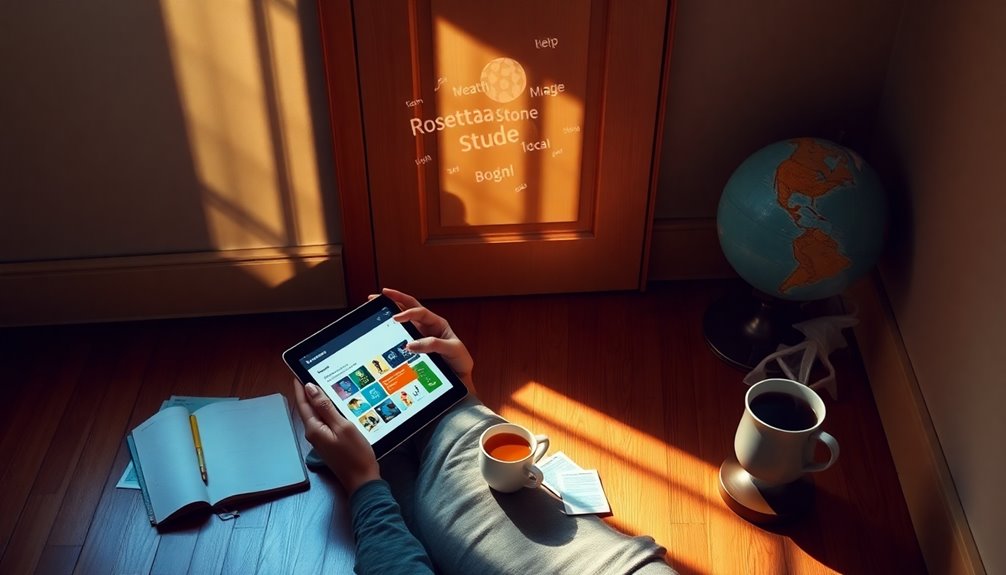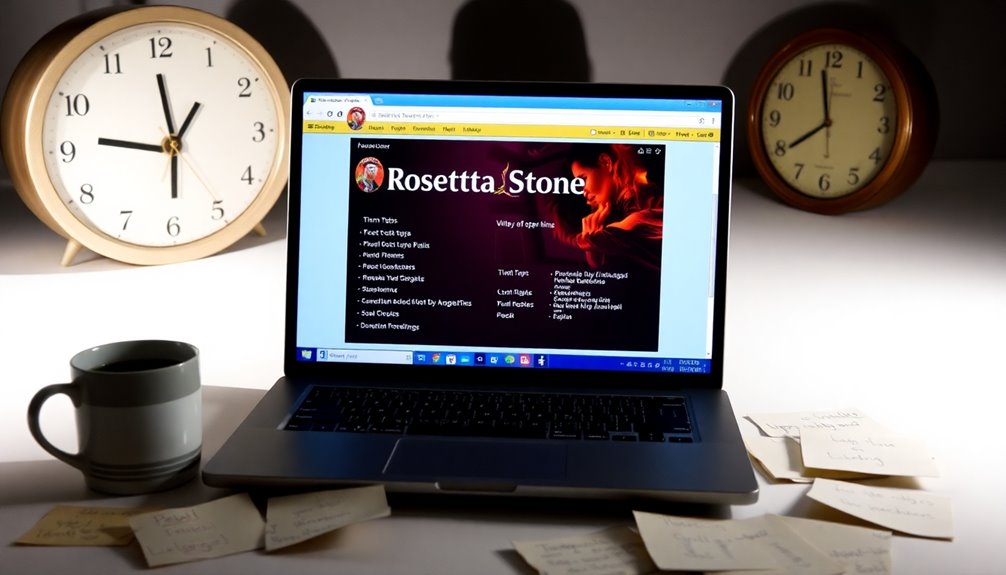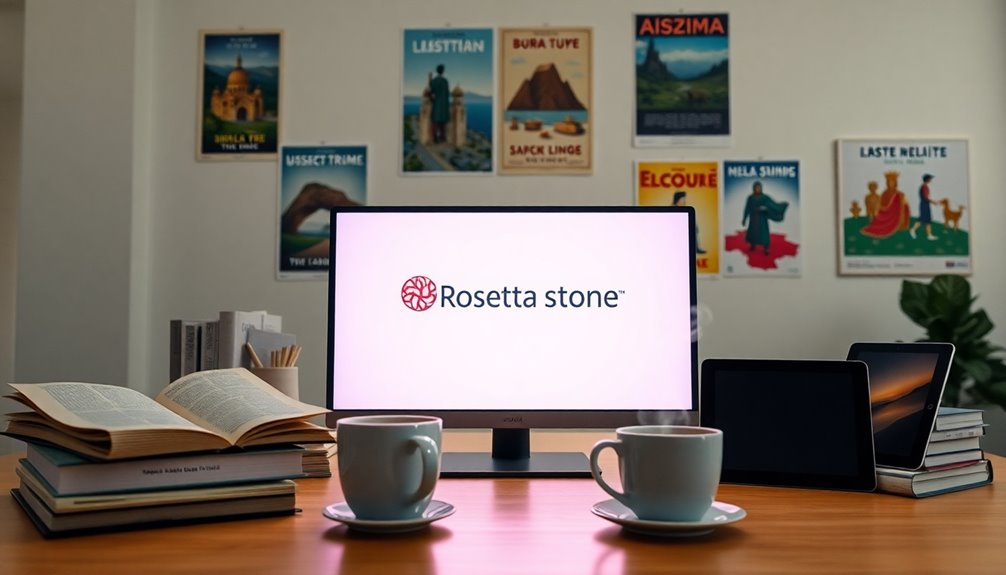I’ve spent quite some time exploring Rosetta Stone’s approach to language learning, and I find it offers a unique, immersive experience. While its structured lessons and speech recognition features stand out, I can’t help but wonder about its limitations. Are learners really seeing the results they hope for? Let’s take a closer look at what this tool can or can’t deliver in the long run.
Key Takeaways
- Rosetta Stone’s immersive approach effectively engages learners, utilizing context to reinforce vocabulary without relying on translations.
- Users report various success levels; some achieve fluency, while others struggle with real-world conversation skills.
- The platform’s speech recognition feature helps improve pronunciation, making it a valuable tool for speaking practice.
- A lack of cultural context and conversational practice limits the overall language learning experience.
- Consistent daily practice, alongside supplemental resources, is recommended for maximizing learning effectiveness with Rosetta Stone.
Overview of Rosetta Stone’s Language Learning Approach

When I first explored Rosetta Stone’s language learning approach, I was immediately struck by its immersive methodology. From the get-go, the program surrounds you with a new language, omitting translations and relying solely on context. This forced me to think in the target language, which quickly proved to be a beneficial challenge. I noticed how the platform emphasized real-world vocabulary and phrases, making conversations feel practical and relevant. Each lesson builds upon the previous one, reinforcing my understanding and retention. The speech recognition feature also caught my attention, as it helped me improve my pronunciation. Overall, Rosetta Stone’s structured yet flexible approach allowed me to progress at my own pace, creating a personalized learning experience that felt both engaging and effective.
Immersive Learning Experience

Diving into Rosetta Stone’s immersive learning experience, I found myself captivated by how the platform actively engages learners in a virtual conversation. The way it integrates images, audio, and text creates a rich environment that mimics real-life interactions. I felt as if I were stepping into a new world, surrounded by the language I was learning. The absence of translations pushed me to think and respond in that language, deepening my understanding and retention. I appreciated how each lesson felt like a mini-immersion session, rather than just rote memorization. This approach not only made learning enjoyable but also accelerated my progress, keeping me motivated. Overall, I left each session feeling accomplished and eager to continue my journey.
Strengths of Rosetta Stone

One of the standout strengths of Rosetta Stone is its user-friendly interface, which makes navigating through lessons a breeze. I found it refreshing how intuitive everything felt, allowing me to focus on my language learning without getting lost in complicated menus. The immersive approach really engages me, making vocabulary and grammar stick through context rather than rote memorization. Additionally, I appreciate the speech recognition feature; it helped me refine my pronunciation and speaking skills. The variety of interactive exercises keeps things interesting and prevents monotony. I also value that I can learn at my own pace, fitting lessons into my busy schedule. Overall, Rosetta Stone creates a supportive environment perfect for anyone eager to learn a new language.
Limitations and Drawbacks

While I appreciate the strengths of Rosetta Stone, I’ve noticed some significant limitations. There’s a lack of conversational practice, which makes it harder to build real-world speaking skills. Additionally, I found that it misses important cultural context, leaving a gap in the learning experience.
Limited Conversational Practice
Although Rosetta Stone excels in building vocabulary and grammar skills, its limited conversational practice poses a significant drawback. While I enjoyed learning words and structure, I often found myself lacking real-world conversation experience. The program mainly emphasizes individual exercises, which didn’t truly prepare me for engaging in dialogues with native speakers. I missed out on opportunities to practice speaking fluidly and responding to spontaneous questions. Without interactive conversational practice, I felt unprepared for real-life situations. I often wondered if I could actually hold a conversation after completing the course. Although it’s a solid foundation, I believe supplementing Rosetta Stone with conversation partners or language exchange apps could better enhance fluency and confidence in speaking.
Cultural Context Missing
Building on the limitations of conversational practice, another notable drawback of Rosetta Stone is its lack of cultural context. When learning a language, understanding the culture behind it is crucial. Without cultural references, I found myself struggling to grasp idioms, humor, and even social norms that are integral to effective communication. For instance, you might learn vocabulary, but without context, I often felt disconnected from the real world where that language is spoken. Additionally, cultural nuances shape how people interact, so missing this aspect feels like learning to drive a car without understanding traffic laws. Ultimately, while Rosetta Stone can teach you the basics, it doesn’t prepare you for real-life conversations enriched with cultural depth.
User Experiences and Testimonials

I’ve had some incredible learning outcomes with Rosetta Stone, and I can’t wait to share them with you. Many users have found success stories that highlight how the program transformed their language skills. Let’s explore these personal experiences and see how they match up with your goals.
Learning Outcomes and Progress
While many users praise Rosetta Stone for its immersive learning experience, individual outcomes can vary significantly. Personally, I found the platform engaging, especially with its visuals and pronunciation feedback. However, my progress felt slower than I expected. Though I learned fundamental vocabulary and grammar, I struggled with conversation skills in real-world situations. Some users I’ve spoken to rave about the consistent practice and how it helped them achieve fluency, but my journey was much more gradual. I’ve noticed improvements in comprehension, yet speaking remains challenging. I believe Rosetta Stone’s structured approach works best for dedicated learners, but it may not suit everyone’s learning style. Ultimately, knowing what to expect can help set realistic goals for achieving language fluency.
Personal Success Stories
Success stories from Rosetta Stone users highlight the platform’s effectiveness for many learners. I remember when I decided to learn Spanish; I was overwhelmed by traditional classes. After a few weeks with Rosetta Stone, I felt a real sense of progress. The immersive approach made the language come alive for me. I still recall the moment I confidently ordered food in Spanish during a vacation. It was exhilarating! Another friend of mine took on French using Rosetta Stone and fell in love with the culture behind the language. He now converses with native speakers effortlessly. Our experiences show that whether you’re a beginner or want to refine your skills, Rosetta Stone can truly transform your language-learning journey.
Comparison With Other Language Learning Tools

When evaluating language learning tools, it’s essential to consider how Rosetta Stone stacks up against its competitors. I’ve tried various platforms like Duolingo and Babbel, each offering unique features. Rosetta Stone emphasizes immersion and context, which helps me think directly in the target language. In contrast, I find Duolingo more gamified and fun, making daily practice less of a chore. Babbel, on the other hand, provides grammar explanations that I often appreciate. While I find Rosetta Stone effective for pronunciation practice, it lacks the flexible structure I enjoy in other tools. Each platform has its strengths, and it really comes down to personal preference. Ultimately, I believe the best tool is one that aligns with your learning style and goals.
Pricing and Subscription Options

Although I’ve found Rosetta Stone to be an effective tool for language learning, it’s important to consider its pricing and subscription options. The platform offers various plans, which can be a bit overwhelming at first. You can choose between a three-month, six-month, or a yearly subscription. Prices tend to vary, with the yearly plan being more cost-effective in the long run. I appreciate that Rosetta Stone occasionally runs promotions, so it’s worth checking for discounts or trial offers. However, keep in mind that some features, like live tutoring sessions, may come at an extra cost. Overall, I think the pricing reflects the quality of the content, but it’s essential to evaluate what fits your budget and learning goals.
Recommendations for Language Learners

As you embark on your language learning journey, it’s crucial to set realistic goals and stay consistent with your practice. I recommend dedicating a specific time each day to immerse yourself in the language. Whether it’s 15 minutes or an hour, consistency beats intensity. Use resources like Rosetta Stone, but don’t rely solely on one tool. Supplement your learning with podcasts, music, or conversation partners. Try speaking with native speakers whenever possible; it’s a game-changer. Don’t shy away from making mistakes; they’re part of the process. Finally, track your progress to stay motivated. Celebrate small victories along the way, and remember that language learning is a marathon, not a sprint. Stay curious, and enjoy the journey!
Conclusion
In conclusion, Rosetta Stone can be a powerful tool for those committed to learning a new language. Its immersive approach makes vocabulary stick, and the speech recognition feature helps with pronunciation. While it might not cover conversational practice and cultural context, many users find success through consistent engagement. If you’re dedicated and ready to put in the effort, Rosetta Stone could be just what you need to embark on your language learning journey.

